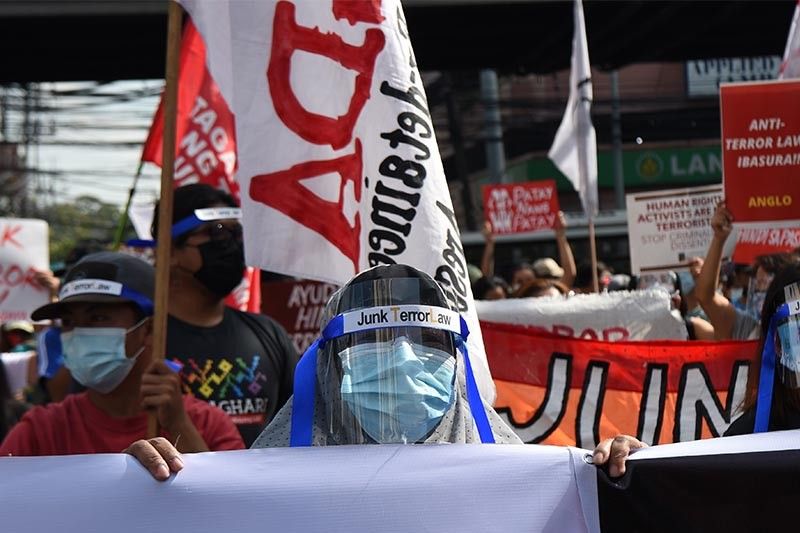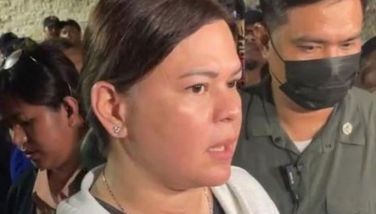Justices ask: Has the anti-terrorism law 'chilled' petitioners into silence?

MANILA, Philippines — How exactly does the much feared Anti-Terrorism Act of 2020 “chill” the public to silence?
Among the main arguments of the petitioners against the law is that Section 4 of Republic Act 11479 or the ATA, which defines terrorism, is vague and overbroad.
They asserted that the Filipino peole have been "chilled" into silence for fear of prosecution under the law, which may result in "warrantless arrest, detention for a maximum of 24 days without charges, designation as a ‘terrorist,’ freezing of assets, and restrictions on movement." The petitioners also said the ATA “fails to give a person of ordinary intelligence fair notice that his or her contemplated speech is prohibited.”
Chilling effect
On the resumption of the oral arguments on the anti-terrorism law petitions, Associate Justice Marvic Leonen asked University of the Philippines Constitutional Law professor John Molo on how the law may have chilled his clients, which include former SC Justice Antonio Carpio and professors of the UP College of Law.
Had Carpio stopped advocating for the Philippines’ rights over the West Philippine Sea? Did the UP law professors stop teaching? Or had they stopped criticizing the government?
Molo said they had not, but they are “chilled.”
In the landmark 2014 case of Disini vs Secretary of Justice, the SC defined chilling effect as “the fear of possible prosecution that hangs of the heads of citizens who are minded to step beyond the boundaries of what is proper.”
Leonen said: “Chilling effect is very subjective.”
The justice pointed out when the Malacañan announced that the Anti-Terrorism Act had been signed, a large protest, one of the biggest since the pandemic, was held in UP Diliman.
“Isn’t chilling effect also a matter of fact?” Leonen asked Molo.
RELATED: Carpio, Carpio-Morales prod SC: Filipinos 'chilled to silence' by fear of anti-terrorism law
Molo answered in the negative. “Your honor, chilling effect within the concept of constitutional law does not refer to an absolutely chilled population. It refers to that pause, in the writer as he composes his words, it is the hesitation inside the mind of the speaker because of a vague and overly broad law, he doesn’t know whether the next word that he will say will be criminal or in this case, mark him as a terrorist,” he said.
Molo continued that while Carpio is not cowering in fear, nor would the former justice ever do so, “it would be another thing to suggest that there is no pause, there is no hesitation.”
Leonen then asked the petitioners to discuss this in their memoranda which will be filed once the oral arguments wrap up.
Void for vagueness doctrine
Associate Justice Alexander Gesmundo, interpellating Free Legal Assistance Group chair Chel Diokno, noted that there is no universal definition of terrorism. He pointed out that the major provisions of the ATA’s definition of terrorism is the same with the European Parliament’s directive 2017/541 on combating terrorism.
Title II Article 3 of the European Parliament directive listed acts that fall under terrorist offenses such as attacks upon a person’s life which may cause death, attacks upon the physical integrity of a person, kidnapping or hostage-taking, causing extensive destruction to a government or public facility and others.
“I’m sorry, your honor, but Í do not agree because the EU directive refers to intentional acts and then specifies them or enumerates them by referring to actual actions that attack on a person's life, integrity, which are all criminal acts,” Diokno responded.
He pointed out that while Section 4(d) and (e) refer to actual criminal acts, Section4(a), (b) and (c) refer to acts “intended to cause destruction, death, etc, which covers non-criminal acts.” Diokno stressed: “It’s the intent that is operative there, your honor.”
READ: Here is how the ATA defines terrorism, which petitioners assail as vague and overbroad. | via @kristinepatag
— Philstar.com (@PhilstarNews) February 9, 2021
Follow our updates on the proceedings here: https://t.co/UPX06YlXQj pic.twitter.com/a1Zs18YDIT
Petitioners also argued that the law falls under the void for vagueness doctrine, which jurisprudence defines as that a “law is facially invalid if men of common intelligence must necessarily guess at its meaning and differ to its application.”
But Gesmundo raised to the petitioners: Isn’t this a doctrine a matter of defense, to avoid prosecution?
“When there is already an actual prosecution. In other words, void for vagueness as a rule may be invoked either at the time of arrest or after conviction if you look at jurisprudence. Then therefore void for vagueness would apply only if there is an actual case,” the justice said.
Gesmundo went on that if the issue of void for vagueness is the lack of notice, there is the right to be informed, which essentially states that the accused should be informed of the nature and cause of the accusation against him so he may prepare an adequate defense.
RELATED: Diokno to SC justices: Social media posts may be considered terrorism under anti-terror law
If the Information or charge sheet lacks elements of the crime, the accused may move for it to be quashed—a legal challenge that would result in the dismissal of the case.
Gesmundo said: “In other words, the right to information or notice is possibly given at the time the accused is arraigned. You will not violate this right to be informed because you explained to him.”
But for Diokno, the right to be informed does not hinge upon how well the accused’s counsel explains the charges. “The right to be informed is a constitutional requirement that the charges must be clear.”
“While the two concepts are connected, I believe the void for vagueness doctrine is different concept that the right to be informed because it has two different elements. One is fair notice to the citizen, and the second is proper standards for law enforcement,” the veteran rights lawyer added.
The debates will resume on February 16, already on its third day, with the remaining justices posing their questions to the petitioners. Next session, retired Justice Francis Jardeleza, appointed as “amicus curiae” or friend of court, will also state his position.
Interpellation of government lawyers led by Solicitor General Jose Calida may also be covered.
Recaps on the two days of the oral arguments meanwhile may be read here and here.
- Latest
- Trending


























